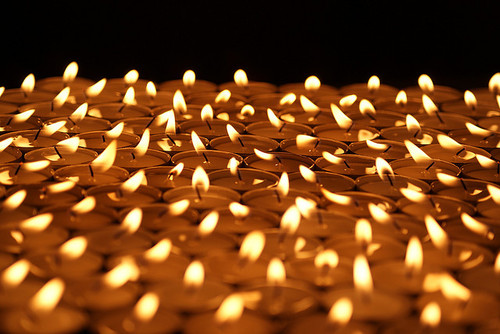The
game was played as night fell upon the region using three separate
rooms. In preparation, participants would light 100 andon in the third
room and position a single mirror on the surface of a small table. When
the sky was at its darkest, guests gathered in the first of the three
rooms, taking turns orating tales of ghoulish encounters and reciting
folkloric tales passed on by villagers who claimed to have experienced
supernatural encounters. These tales soon became known as kaidan. Upon
the end of each kaidan, the story-teller would enter the third room and
extinguished one andon, look in the mirror and make their way back to
the first room. With each passing tale, the room slowly grew darker and
darker as the participants reached the one hundredth tale, creating a
safe haven for the evocation of spirits.
However, as the game reached the ninety-ninth tale, many participants would stop, fearful of invoking the spirits they had been summoning.
While the exact origins of Hyakumonogatari Kaidankai are unknown, it was believed that it was first played amongst the samurai class as a test of courage. In Ogita Ansei's 1660 nursery tale "Otogi Monogatari" a version of the game was described in which the narrative tells of several young samurai telling tales in the Hyakumonogatari Kaidankai fashion. In the tale, as one samurai finished the one hundredth tale, he began to extinguish the candle when suddenly he sees a giant gnarled hand descend upon him from above. While some of the samurai cowered in fear, a swipe of his sword revealed the hand to be merely the shadow of a spider.
At first, the game of Hyakumonogatari Kaidankai was popular amongst the aristocratic warrior class, but it soon garnered favorable reputation amongst the working class peasants and town people. With a heightened interest in telling newer and original kaidan, people began scouring the countryside for tales of the mysterious, many of which combined a mixture of ghostly vengeance and elements of karma in Buddhism.
Japanese culture and heritage are rich with spirituality and superstition. In Japan, you should "cleanse" yourself after going to a funeral by throwing salt over your body. Cutting your fingernails in the evening is bad luck, and so is using or referring to the number four (homonym for death) or nine (homonym for suffering). However, few practices are quite as fascinating as the 100 ghost stories game. This was a popular parlor game called Hyakumonogatari Kaidankai, from the Edo period (1603 - 1868). It worked as follows:
Urban Legend of 100 Candles Game - Hyakumonogatari Kaidankai
However, as the game reached the ninety-ninth tale, many participants would stop, fearful of invoking the spirits they had been summoning.
While the exact origins of Hyakumonogatari Kaidankai are unknown, it was believed that it was first played amongst the samurai class as a test of courage. In Ogita Ansei's 1660 nursery tale "Otogi Monogatari" a version of the game was described in which the narrative tells of several young samurai telling tales in the Hyakumonogatari Kaidankai fashion. In the tale, as one samurai finished the one hundredth tale, he began to extinguish the candle when suddenly he sees a giant gnarled hand descend upon him from above. While some of the samurai cowered in fear, a swipe of his sword revealed the hand to be merely the shadow of a spider.
At first, the game of Hyakumonogatari Kaidankai was popular amongst the aristocratic warrior class, but it soon garnered favorable reputation amongst the working class peasants and town people. With a heightened interest in telling newer and original kaidan, people began scouring the countryside for tales of the mysterious, many of which combined a mixture of ghostly vengeance and elements of karma in Buddhism.
Japanese culture and heritage are rich with spirituality and superstition. In Japan, you should "cleanse" yourself after going to a funeral by throwing salt over your body. Cutting your fingernails in the evening is bad luck, and so is using or referring to the number four (homonym for death) or nine (homonym for suffering). However, few practices are quite as fascinating as the 100 ghost stories game. This was a popular parlor game called Hyakumonogatari Kaidankai, from the Edo period (1603 - 1868). It worked as follows:
Urban Legend of 100 Candles Game - Hyakumonogatari Kaidankai


No comments:
Post a Comment